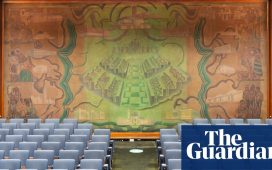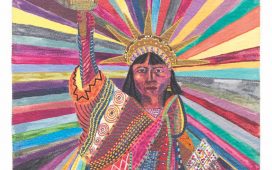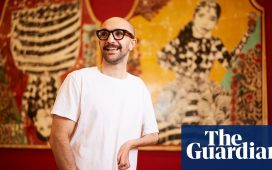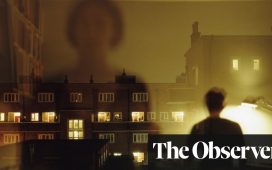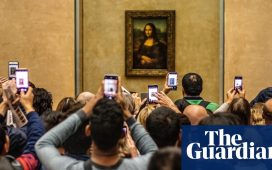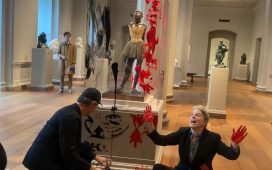The Italian photographer Marco Gualazzini has been dropped from the shortlist of the revered W. Eugene Smith Grant in Humanistic Photography in the wake of allegations he identified child victims of rape while working with humanitarian charities in India and Africa.
By publishing pictures alongside the victims’ full names, Gualazzini stands accused of breaking child protection laws and potentially putting the subjects of the photographs in grave danger.
Gualazzini, who is represented by Contrasto agency, had initially been included on the grant’s shortlist for his 2019 series titled Mwavita—Born at Time of War, a body of work focusing on child survivors of the civil war in Congo.
But allegations against Gualazzini while he was on a field trip in India prompted the award’s adjudication panel chair Marcia Allert, also the director of visual journalism at the Dallas Morning News, to publicly retract Gualazzini’s inclusion in the prize in August.
The allegations centre primarily on a series made by Gualazzini in India in 2017 while working with ActionAid India, a humanitarian charity that supports the Gauravi One-Stop Crisis Centre in Madhya Pradesh, a shelter for often impoverished female survivors of sexual and domestic violence.
Gualazzini is accused of representing underage women at the centre as survivors of rape in a series of social media posts on Instagram and an Italian website during and shortly after the shoot.
The underage women Gualazzini photographed at the Gauravi centre were fully identifiable in the images and their real names were given in the captions. Gualazzini then detailed how the women had come to be the victims of sexual abuse. The captions were often inaccurate and misrepresented the deeply traumatic experiences the women had been through, his critics allege. Gualazzini declined to comment for this article.
Indian safeguards
In India—as in Britain—it is illegal to publish a photograph of a child that identifies them as a survivor of sexual abuse, under India’s Protection of Children from Sexual Offences Act, 2012. By publishing images of underage women who had been raped, Gualazzini may have broken Indian law while on Indian soil. Some of the images are still discoverable online today.
During his time at the centre, Gualazzini worked closely with Sarika Sinha, the director of policy, campaigns and communications for ActionAid India. Sinha tells The Art Newspaper: “He was asking very intimate questions about the women. Then he started filming them, without properly asking them first, from angles that made me feel very uncomfortable.”
Shortly afterwards, and without warning, Gualazzini began to post images of the women at the centre, along with misleading or inaccurate captions, to his Instagram feed.
Sinha says that, in parts of rural India and in inner-city slums, identifying young women as victims of sexual assault potentially puts them in grave danger of shame-based stigmatisation, ostracisation from their families, violent abuse and so-called honour killings. By identifying or wrongly claiming the women in his photographs had been raped, Gualazzini may have risked their future survival within their own communities.
“Putting these images on the internet with such impunity could have caused huge damage to these women,” Sinha says. “When I saw what he had published, I was totally shocked. To sensationalise their stories in this way, to do this without properly seeking consent, without consulting with us at all—how unethical can you be? And [the photographs] are illegal in India, too. Now their names are out there. And yet this man is still winning photography prizes in the West.”
Sinha raised her concerns with Gualazzini and affiliates at ActionAid Italy. She then spoke to Smita Sharma, a respected Delhi-based photojournalist for National Geographic among others. Sharma also raised the matter with the same organisations before then confronting Gualazzini via Instagram regarding his conduct—he blocked her without a response.
Sinha raises particular objections over Gualazzini’s image of a teenager whose real name was given in his post. The image, initially published on Gualazzini’s Instagram page, and later deleted, read: “[NAME] is an 18-year old Muslim girl who was married off at the age of 13 to settle her father’s gambling debts. The marriage soon degenerated into continual abuse and domestic rape on the part of her husband.”
In a video filmed by Sharma and seen by The Art Newspaper, the teenage girl’s mother said each element of this caption was inaccurate. “What he’s written about [NAME] is wrong”, the mother said of Gualazzini. “He should not have written it. It’s totally wrong. If he comes in front of me, I’ll set him right. He is making fun of us.”
Sinha also recounts Gualazzini’s encounter with a Muslim girl from a nearby slum who came to the centre at age 14 when seven months pregnant. She had been raped repeatedly by a man in his 50s, then beaten by her older brother and ostracised by her family. The girl gave birth at the centre, and the child was given up for adoption. When Gualazzini met the girl, she was attending a school where no-one beyond the principal knew she was a rape survivor who had birthed a child. Gualazzini published a fully identifiable image of the girl on an Italian website, with her name and identifying her as a sexual abuse survivor. The image is still viewable today.
“She is doing well at school, she is putting her life back together,” Sinha says. “She has risen from the ashes, the least we can do now is respect that, and respect her privacy. But those images will be online forever, and she’ll never be able to do anything about them. I am speaking out because I don’t want photographers to do the same thing to other women.”
African series scrutinised
Also under scrutiny is a series Gualazzini made in Congo in 2019, while working with the Italian humanitarian organisation AVSI Foundation and the news organisation Inside Over.
The series shot in the African country, which was initially shortlisted for the W. Eugene Smith prize, included fully identifiable portraits of children whom Gualazzini claimed were aged between 11 and 13. One image was published with the caption: “So far, she has told her story to no-one, for fear of discrimination and of being repudiated by her husband, who repudiated his first wife after she had also been raped.”
Images from the series were published in mainstream media outlets including Vanity Fair Italy and Al Jazeera, as well as Gualazzini’s social media feeds.
Although these allegations first surfaced in 2017, they did not stop Gualazzini from winning major prizes; he was awarded first prize in the 2019 World Press Photo’s Environment category for a separate series titled The Lake Chad Crisis.
Unlike the W. Eugene Smith prize, World Press Photo decided not to act on the allegations and upheld the award to Gualazzini.
In a statement published on 9 August, the board of the W. Eugene Smith prize confirmed it “had taken the decision to withdraw Marco Gualazzini’s submission” from the 2021 edition of the grant. “We recognise today that the photojournalism industry is in the process of reckoning with many of its historical traditions and practices,” the statement read. “And we strive to reflect the best possible path forward for the future of documentary photography.”


